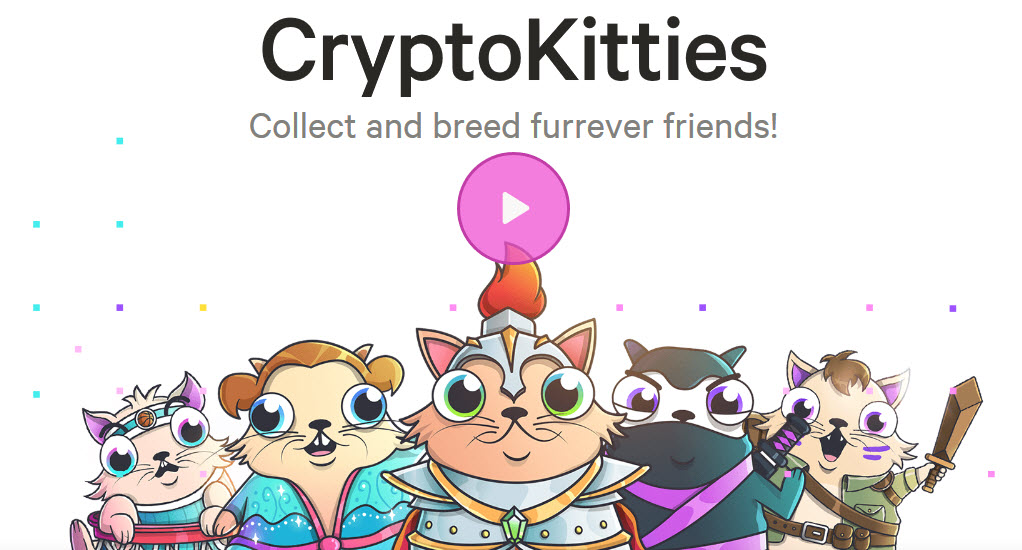CryptoKitties is a blockchain based video game that operates on Ethereum’s underlying blockchain network as a non fungible token (NFT).
Players can purchase, sell, collect, and breed various types of virtual cats.

CryptoKitties is an important part of blockchain history since it represents one of the earliest attempts to utilize blockchain technology for a game, i.e. using the blockchain “just for fun”, as opposed to the more serious blockchain purposes like cryptocurrency, anonymous transfer of important information, etc.
CryptoKitties was developed by Axiom Zen and relased in 2017. Within a week, the game had become so popular that the players caused a congestion of the Ethereum network. This was the cause of some concern, since CryptoKitties were slowing down the processing of more serious transfers on the network. One week after the release of CryptoKitties, Etherscan reported a sixfold increase in pending transactions on Etherum. As a response, the Ethereum miners increased the gas limit, thus permitting more data per block.
How does it work?
Ethereum’s blockchain is utilized to track ownership of the various virtual cats. Each cat is represented in the form of a non-fungible ERC-721 token. This solution allows each cat to have specific attributes (known in the game as cattributes).
CryptoKitties are distributed automatically, via smart contract, at a rate of 1 every 15 minutes (672 per week).
The cats
- The game has a built-in 4 billion limit on the total number of cats that can be bred.
- Each cat has a distinct visual appearance (phenotype) determined by its immutable DNA (genotype). The data for this is stored in the smart contract.
- Each cat is fertile, but has no permanently assigned sex. It and can act as either matron or sire. The owner selects with each breeding interaction.
- A cat can not engage in simultanous breeding sessions. Also, it needs some recovery time after each breeding. For each breeding it carries out, it will need an increasingly longer time to recover.
- Each cat carry a unique number and 256 bit distinct genome with DNA and different attributes that can be inherited by its offspring. Just as in nature, many different traits can be passed down from the parents to the kitten. Examples of inheritable traits in the game are base colour, accent colour, highlight colour, pattern, fur, mouth shape, eye shape, and eye colour.
- In addition to obtaining cats through breeding, players can also buy, sell and trade cats among themselves. Auctions occur where the price is determined in the cryptocurrency Ether (ETH).
- Until November 2018, Axiom Zen released a new cat every 15 minutes, with the rest of the cat supply being determined by the players breeding of cats.
- If you own a cat, it can not be transferred without your permission, not even by the game developers.
History
CryptoKitties was developed by the Vancouver-based studio Axiom Zen. On 10 October, 2017, they revealed a test version of the game at ETH Waterloo, the world’s largest Ethereum hackathon. The public release took place on 28 November 28 that same year.
The market price of cats within the game rose quickly. By 2 December, Genesis – the first of the cats – was sold for 246.9255 ETH, a price equal to roughly 117,000 USD.
In March 2018 it was announced that CryptoKitties would be spun off and form a separate company. 12 million USD was raised from various venture capital firms and angel investors during an investment round led by Union Square Ventures and Andreessen Horowitz.
In May 2018, CryptoKitties launched a Stephen Curry-branded CryptoKitty. (Stephen Curry is a professional basketball players in the United States.)
In October 2018, CryptoKitties reached an important milestone as cat #1 million was bred.
In November 2018, Dapper Labs (spun out of Axiom Zen as the developer of CryptoKitties) went through a venture round led by Venrock and raised 15 million USD.
This article was last updated on: December 3, 2019
